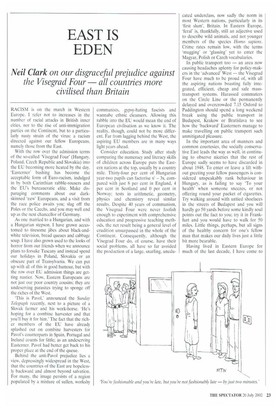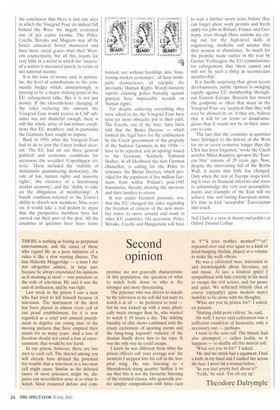EAST IS EDEN
Neil Clark on our disgraceful prejudice against
the Visegrad Four — all countries more civilised than Britain
RACISM is on the march in Western Europe. I refer not to increases in the number of racial attacks in British inner cities, nor to the rise of anti-immigration parties on the Continent, but to a particularly nasty strain of the virus; a racism directed against our fellow Europeans, namely those from the East.
With the row over the admission terms of the so-called 'Visegrad Four' (Hungary, Poland, Czech Republic and Slovakia) into the EU becoming more heated by the day, 'Easterner' bashing has become the acceptable form of Euro-racism, indulged in by both Carinthian rabble-rousers and the EU's bureaucratic elite. Make disparaging comments about our darkskinned 'new' Europeans, and a visit from the race police awaits you; slag off the Poles or the Czechs, and you may well end up as the next chancellor of Germany.
As one married to a Hungarian, and with a Hungarian stepson, I have grown accustomed to tiresome jibes about black-andwhite television, bread queues and cabbage soup. I have also grown used to the looks of horror from our friends when we announce plans to forsake Tuscany and instead spend our holidays in Poland, Slovakia or an obscure part of Transylvania. We can put up with all of this in good humour, but with the row over EU admission things are getting nastier. Now, Eastern Europeans are not just our poor country cousins; they are undeserving parasites trying to sponge off the riches of the West.
'This is Pavol,' announced the Sunday Telegraph recently, next to a picture of a Slovak farmer and his work-horse. 'He's hoping for a combine harvester and that you'll buy it for him.' The fact that the richer members of the EU have already splashed out on combine harvesters for Pavol's counterparts in Spain, Portugal and Ireland counts for little; as an undeserving Easterner, Pavol had better get back to his proper place at the end of the queue.
Behind the anti-Pavol prejudice lies a view. depressingly widespread in the West, that the countries of the East are hopelessly backward and almost beyond salvation. For many, the image persists of a region populated by a mixture of sullen, workshy communists, gypsy-hating fascists and wannabe ethnic cleansers. Allowing this rabble into the EU would mean the end of European civilisation as we know it. The reality, though, could not be more different. Far from lagging behind the West, the aspiring EU members are in many ways light years ahead,
Consider education. Study after study comparing the numeracy and literacy skills of children across Europe puts the Eastern nations at the top, usually by a country mile. Thirty-four per cent of Hungarian year-two pupils can factorise x2 – 3x, compared with just 8 per cent in England, 4 per cent in Scotland and 0 per cent in Norway; tests in arithmetic, geometry, physics and chemistry reveal similar results. Despite 40 years of communism, the Visegrad Four were never foolish enough to experiment with comprehensive education and progressive teaching methods, the net result being a general level of erudition unsurpassed in the whole of the Continent. Consequently, although the Visegrad Four do, of course, have their social problems, all have so far avoided the production of a large, snarling, unedu
cated underclass, now sadly the norm in most Western nations, particularly in its 'first slum', Britain. In Eastern Europe, 'feral' is, thankfully, still an adjective used to describe wild animals, and not younger members of the species Homo sapiens. Crime rates remain low, with the terms 'mugging' or 'glassing' yet to enter the Magyar, Polish or Czech vocabularies.
In public transport too — an area now causing headaches aplenty for policy-makers in the 'advanced' West — the Visegrad Four have much to be proud of, with all the aspiring nations boasting fully integrated, efficient, cheap and safe masstransport systems. Harassed commuters on the Circle Line or the permanently delayed and overcrowded 7.15 Oxford to Paddington should spend a long weekend break using the public transport in Budapest, Krakow or Bratislava to see how the 'backward' Easterners manage to make travelling on public transport such unmitigated pleasure.
In the important area of manners and common courtesies, the socially conservative East leads the way as well, in continuing to observe niceties that the rest of Europe sadly seems to have discarded in about 1948. To enter or leave a lift without greeting your fellow passengers is considered unspeakably rank behaviour in Hungary, as is failing to say 'To your health' when someone sneezes, or not offering round your packet of cigarettes. Try walking around with untied shoelaces in the streets of Budapest and you will hardly go 50 yards before some kindly soul points out the fact to you; try it in Frankfurt and you would have to walk for 50 miles. Little things, perhaps, but all signs of the healthy concern for one's fellow man that makes our daily lives just a little bit more bearable.
Having lived in Eastern Europe for much of the last decade, I have come to the conclusion that there is just one area in which the Visegrad Four do indeed fall behind the West: the hugely overrated one of per capita income. The Poles, Czechs, Slovaks and Magyars may all be better educated, better mannered and have more social graces than their Western counterparts, but all this counts for very little in a world in which the 'success' of a nation is measured purely in terms of net national income.
It is the issue of money and, in particular, the level of contributions to the community budget which, unsurprisingly, is proving to be a major sticking point in the EU enlargement talks. But it is not just money. If the eleventh-hour changing of the rules reducing the amount the Visegrad Four would receive in CAP subsidies was not shameful enough, there is still the whole array of last-minute conditions that EU members, and in particular the Germans, have sought to impose.
Back in 1993, what the Visegrad Four had to do to join the Union looked clearcut. The EU had set out three general political and economic conditions for accession, the so-called 'Copenhagen criteria'. These included the 'stability of institutions guaranteeing democracy, the rule of law, human rights and minority rights', 'the existence of a functioning market economy', and the 'ability to take on the obligations of membership'. A fourth condition referred to the Union's ability to absorb new members. Nine years on, it would take a real pedant to argue that the prospective members have not carried out their part of the deal. All the countries in question have been trans formed, not without hardship, into 'functioning market economies'; all have multiparty democracies; all (despite the inevitable Human Rights Watch/Amnesty reports claiming police brutality against gypsies) have impeccable records on 'human rights'.
Yet despite achieving everything they were asked to do, the Visegrad Four have seen yet more obstacles put in their path. The Czechs, out of the blue, have been told that the Benes Decrees — which formed the legal basis for the confiscation by the Czech government of the property of the Sudeten Germans in the 1930s — have to be repealed, and an apology issued to the Germans. Similarly, Edmund Stoiber, in all likelihood the next German chancellor, is calling for the Poles to renounce the Bierut Decrees, which provided for the expulsion of five million Germans from within Poland's post-I945 boundaries, thereby allowing the survivors and their families to return, It was under German pressure, too, that the EU changed the rules regarding the freedom of citizens of the new member states to move around and work in other EU countries. On accession, Poles, Slovaks, Czechs and Hungarians will have to wait a further seven years before they can forget about work permits and freely apply for jobs in Britain, France and Germany, even though those nations are crying out for the high-level skills in engineering, medicine and science that they possess in abundance. So much for the promise made earlier in the year by Gunter Verheugen, the EU commissioner for enlargement, that 'there cannot and will not be such a thing as second-class membership'.
It is hardly surprising that, given recent developments, public opinion is swinging rapidly against EU membership throughout Eastern Europe. Brussels has moved the goalposts so often that many in the Visegrad Four are sceptical that they will ever be allowed in; or, if they are, believe that it will be on terms so disadvantageous that it would not be in their interests to join.
'The fact that the countries in question have belonged to the history of the West for six or seven centuries longer than the USA has been forgotten,' wrote the Czech novelist Milan Kundera apropos the 'Eastern bloc' nations of 20 years ago. Now, despite the intervening fall of the Berlin Wall, it seems that little has changed. Only when the rest of Europe stops lording it over its financial inferiors and starts to acknowledge the very real accomplishments and triumphs of the East will we achieve true and lasting European union, It's time to kick 'acceptable' Euro-racism into touch.
Neil Clark is a tutor in history and politics at Oxford Tutorial College.



























































 Previous page
Previous page